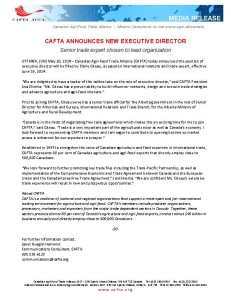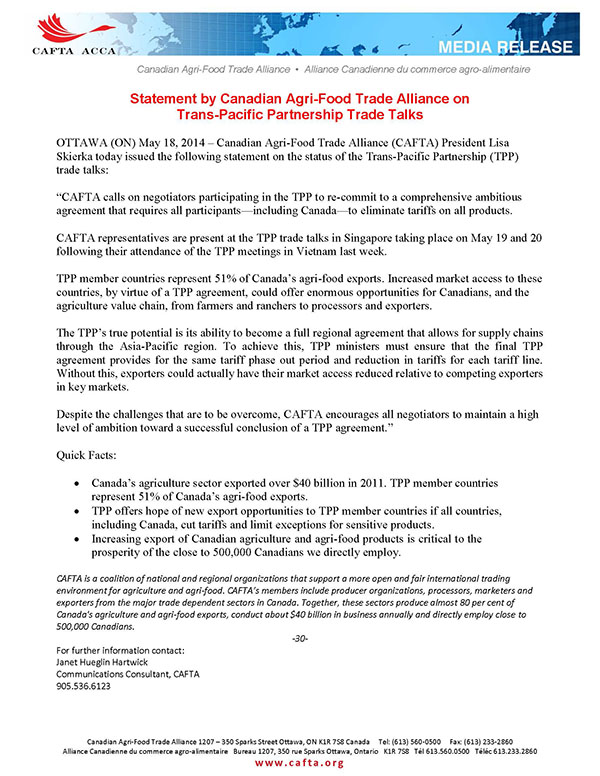CAFTA ANNOUNCES NEW EXECUTIVE DIRECTOR.
Senior trade expert chosen to lead organization.
OTTAWA, (ON) May 28, 2014 – Canadian Agri-Food Trade Alliance (CAFTA) today announced the position of executive director will be filled by Claire Citeau, a seasoned international relations and trade expert, effective June 16, 2014.
“We are delighted to have a leader of this calibre take on the role of executive director,” said CAFTA President Lisa Skierka. “Ms. Citeau has a proven ability to build influencer networks, design and execute trade strategies and advance agriculture and agri-food interests.”
Prior to joining CAFTA, Citeau served as a senior trade official for the Alberta government in the role of Senior Director for Americas and Europe, International Relations and Trade Branch, for the Alberta Ministry of Agriculture and Rural Development.
“Canada is in the midst of negotiating free tade agreements which makes this an exciting time for me to join CAFTA,” said Citeau. “Trade is a very important part of the agricultural sector as well as Canada’s economy. I look forward to representing CAFTA members and I am eager to contribute to opening borders so market access is enhanced for our exporters to prosper.”
Established in 1997 to strengthen the voice of Canadian agriculture and food exporters in international trade, CAFTA represents 80 per cent of Canada’s agriculture and agri-food exports that directly employ close to 500,000 Canadians.
“We look forward to further promoting key trade files including the Trans-Pacific Partnership, as well as implementation of the Comprehensive Economic and Trade Agreement between Canada and the European Union and the Canada-Korea Free Trade Agreement,” said Skierka. “We are confident Ms. Citeau’s extensive trade experience will result in new and prosperous opportunities.”


 The Barley Council of Canada (BCC) develops and implements a common vision that enables long-term profitability and sustainable growth of the Canadian barley industry through value chain collaboration. The BCC takes a national leadership role in coordinating all links in the barley value chain and collaborates with other organizations with a barley mandate. BCC supports barley innovation and variety research, promotes best management practices, supports market development for all barley end-uses, improves international and domestic market access and increases industry understanding.
The Barley Council of Canada (BCC) develops and implements a common vision that enables long-term profitability and sustainable growth of the Canadian barley industry through value chain collaboration. The BCC takes a national leadership role in coordinating all links in the barley value chain and collaborates with other organizations with a barley mandate. BCC supports barley innovation and variety research, promotes best management practices, supports market development for all barley end-uses, improves international and domestic market access and increases industry understanding.


